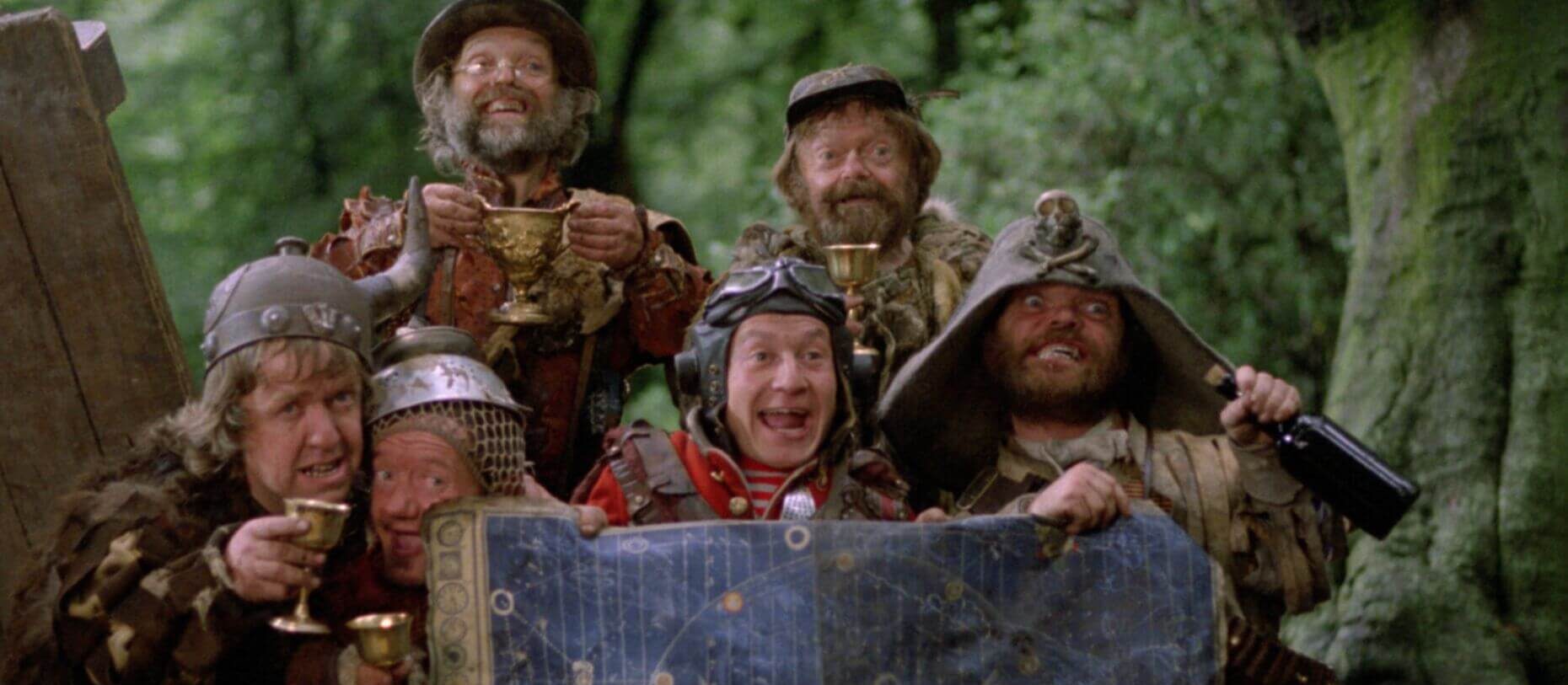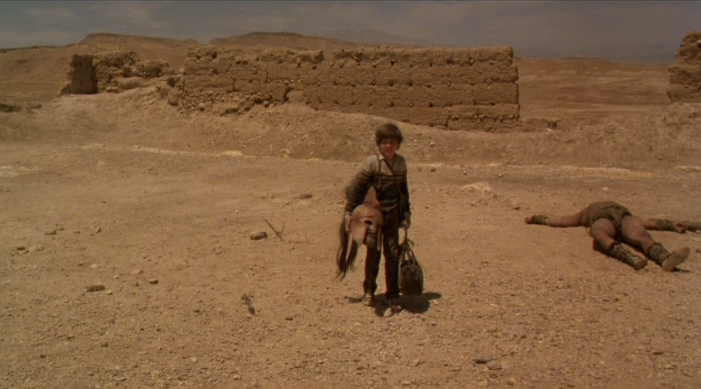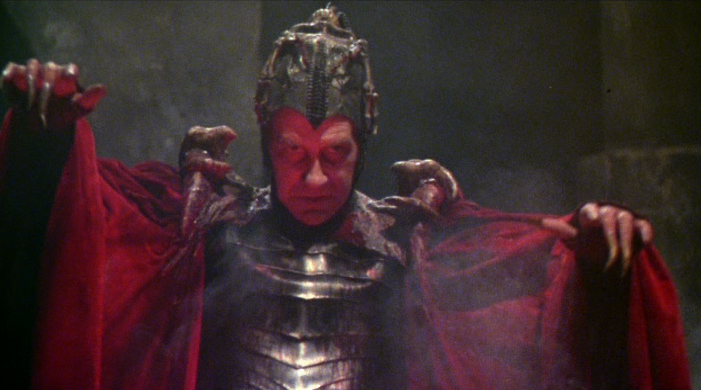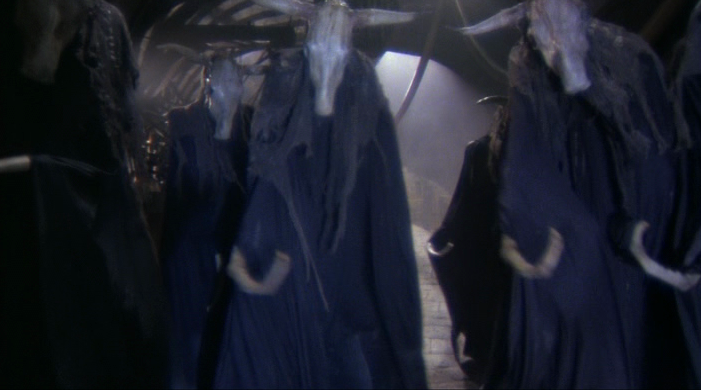

“You are so mercifully free of the ravages of intelligence.”
After co-directing the cult classic Monty Python and the Holy Grail with fellow Monty Python member Terry Jones, Terry Gilliam stretched his directorial wings further with Jabberwocky in 1977, a release that received mixed criticism. In 1981, he returned with another imaginative fantasy called Time Bandits, an irreverent sci-fi fairy tale featuring a cadre of dwarves and several members of the Python troupe. The film’s breakneck pacing, era- and genre-hopping storyline, eye-catching mise en scène, and creative camerawork make it instantly memorable, and its straddled stance between children’s adventure story and social critique make it interesting to experience at different ages. As with many Gilliam/Python films, the internal logic of Time Bandits doesn’t always add up, but it is a fun ride anyway.
The film begins with a young boy, Kevin (Craig Warnock), who is fascinated by the remarkable characters he reads about in his history books. He lives with overbearing parents who line their furniture in plastic, obsess over the quality of their kitchen appliances, and simply cannot pull their eyes away from the television set. As he lies in bed at night, an armored knight burst through is wardrobe, startling Kevin to wakefulness. He hides as the knight rides into a forest where previously his bedroom wall had been. The room returns to normal. The next night, Kevin prepares himself by smuggling a Polaroid camera into his room; but instead of a knight, this time six dwarves come out of his wardrobe. The band of dwarves mistake Kevin for the Supreme Being, the entity that the dwarves are fleeing from because they have stolen The Map. They quickly enlist Kevin’s help as the real Supreme Being is hot on their trail. Like the young Barry in Close Encounters of the Third Kind, Kevin is immediately intrigued by his rambunctious visitors and eagerly joins their quest.
The dwarves are Randall (David Rappaport), Fidgit (Kenny Baker), Strutter (Malcolm Dixon), Og (Mike Edmonds), Wally (Jack Purvis), and Vermin (Tiny Ross). The group, now seven strong with the addition of Kevin, discover that the wall of Kevin’s bedroom can be moved, and they push it down a seemingly endless hallway while the disembodied glowing head of the Supreme Being trails them. As they fall into a void at the end of the hallway, Kevin begins a time-hopping adventure.

As they jump through time and space, visiting Napoleon Bonaparte, Robin Hood, King Agamemnon, and the Titanic, Kevin documents their journey with his Polaroid. We learn that the dwarves were at one time hired by the Supreme Being to repair holes in the fabric of space-time, but that they had realized the potential to utilize the map for thievery. Unbeknownst to the dwarves, their escapades are being monitored by Evil (David Warner), a malevolent being who sports what appears to be a facehugger from Alien attached to the top of his skull. He wishes to steal The Map and use it to remake creation in his own image. “Icebergs into fire!” he exclaims. “And fire into a mighty rushing wind which will cover the face of the earth… and wipe clean the scourge of wooly thinking once and for all.” His henchman Benson contributes a delightful addendum to his master’s plan: “We can make beans into peas!”
Kevin is separated from the group and helps King Agamemnon defeat the minotaur, and the king decides to adopt Kevin as his own son. But the dwarves arrive to rob the king of his riches, take Kevin with them as they escape through a time hole. They then enter the Time of Legends, where they encounter an ogre and a giant. The greedy dwarves are lured to the Fortress of Ultimate Evil, where “The Most Fabulous Object in the World” awaits them. They are tricked into handing The Map over to Evil in a bizarre scene that features Kevin’s parents in a gameshow-esque setup, where the prize is an innovative kitchen appliance.
The climax involves an all-out assault by a ragtag militia from several eras of history—archers, army tanks, aircraft. They are finally saved by the Supreme Being (Ralph Richardson), who appears in human form now, and casually speaks to the group. He appears weary, bored, and benign. When Kevin asks him why there must be evil in the world, he replies, “Ah. I think it’s something to do with free will.”

The ending is flabbergasting. As Kevin wakes up in his bed where the adventure began, smoke fills his room from a house fire caused by one of his mother’s kitchen appliances. When evil was defeated, he hardened into a charred statue that broke into pieces. The dwarves cleaned up all the harmful shards except one, which Kevin’s parents find in a toaster that they risked the flames to save from destruction. Kevin finds the Polaroid pictures of his adventures in his pocket, and calls out to warn his parents not to touch the chunk of evil. But they do, and they are obliterated. Seemingly unconcerned, the fire chief (also Sean Connery) winks at Kevin as the fire truck pulls away from the house. Curtains.
Although the film is highly unconventional, it works because it is funny; it has many other laudable qualities, but without humor they would not be worthy of attention. The antics of the dwarves and the silly situations they bounce between keep the film on the brink of hilarity throughout. Ian Holm gives a great performance as Napoleon, sporting a fake hand and obsessed with his height. He enjoys a puppet show because the puppets are so small, and in a monologue at dinner, he rambles on, listing the heights of great men of history. “Alexander the Great… five feet exactly. Isn’t that incredible? Alexander the Great, whose empire stretched from India to Hungary—one inch shorter than me. […] Charlemagne… a dumpy little five-footer. Squatty little chap.”
Fellow Pythons John Cleese and Michael Palin also come through brilliantly in small roles, as Robin Hood and Vincent, respectively. Cleese portrays the good-natured Robin Hood as oblivious to the fact that the dwarves have stolen the treasure (from Napoleon) for themselves. The whole scene reminds of Monty Python’s earlier work, and there is very Python-esque exchange between Robin Hood and Kevin.
RH: Incidentally, would any of you like to stay on and help us with our work? There’s still so much wealthy to redistribute.
K: Oh, I’d like to stay.
RH: Jolly good. What’s your name.
K: Uh, Ke–. (A dwarf grabs Kevin by the arm and begins dragging him away.)
RH: Ke– what a jolly nice name.
K (to the dwarves): Let me go.
RH: Well, never mind. Cheerio. Thank you very much. Thank you very much. Thank you very, very, very, very much.
Palin and Shelley Duval portray a couple that appears in several different eras. Vincent and Pansy are always close to a moment of romantic connection when the dwarves fall on top of them. Aboard the Titanic, Vincent becomes convinced that Pansy loves him despite the unsightly growth on the end of his nose. As he kneels to ask for her hand in marriage, the dwarves land on them, dislodging his toupee. As Pansy flees in horror, he follows after her, yelling in his defense, “Pansy! Pansy! I can explain! It’s only the thing on my nose and the hair piece. Everything else is fine!”

The film’s most striking quality is its dual appeal to both children and adults. On a surface level, a child (especially one with an interest in history) could enjoy the flimsy plot as it jumps from era to era, and will laugh at the interactions of the immature dwarves. But there are also many darker elements that kind of sneak under the radar of an adult viewer, but could absolutely haunt the dreams of an innocent child. In the Napoleonic Wars, a man on fire jumps into the water; the theater master holds a gun to his head and puts his neck in a noose when he thinks Napoleon is not enjoying the show. A companion of Robin Hood—who speaks unintelligibly—insists on punching the poor in the face after they receive a possession from the band of merry men. When the dwarves steal the map back from Evil, he unleashes a gang fleet-footed demons that look like Nazgul from Lord of the Rings with horned animal skulls mounted upon their shoulders.
There are plenty of things that could be read into the film, which Gilliam considered the first entry in his “Trilogy of Imagination”—followed by Brazil and The Adventures of Baron Munchausen. Gilliam’s views on the indifference of God and consumer culture (even the furniture in Evil’s lair is covered in plastic, and the “Most Fabulous Object in the World” is a kitchen appliance) subliminally pervade. Although the adventure seems like every little boy’s dream, Kevin is often pushed forward when he would rather stay put, and his parents are obliterated in the film’s closing moments, undercutting the rewards of his imaginative spirit that initially set him on his journey. Time Bandits is whimsical and fantastical, sure, but it has an unsettling undercurrent emanating from the eclectic mind of Gilliam.